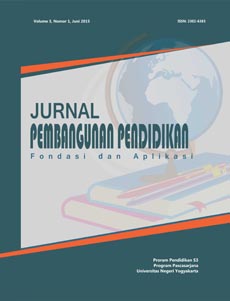Merdeka belajar dalam pandemi: Persepsi mahasiswa terhadap pembelajaran jarak jauh berbasis mobile
DOI:
https://doi.org/10.21831/jppfa.v8i2.35747Keywords:
Merdeka belajar, mobile learning, persepsi mahasiswa, pembelajaran jarak jauh, freedom of learning, student perceptions, distance learningAbstract
Mobile learning merupakan salah satu alternatif model pembelajaran jarak jauh (PJJ). Terlebih lagi dengan misi merdeka belajar dari pemerintah membuat mobile learning semakin dikedepankan. Hal ini tidak terlepas dari berbagai kemudahan yang ditawarkan dalam model mobile learning. Penelitian ini bertujuan untuk mendeskripsikan persepsi mahasiswa terhadap penggunaan mobile learning dalam perkuliahan. Penelitian menggunakan desain deskriptif kuantitatif. Pengumpulan data menggunakan survei. Instrumen yang digunakan berupa angket. Subjek penelitian mahasiswa PGSD Universitas Mataram. Jumlah responden yang terlibat dalam penelitian sejumlah 158 mahasiswa. Tahapan penelitian dimulai dari pembuatan instrumen, pengumpulan data, klasifikasi, tabulasi, penyajian, dan deskripsi kesimpulan. Data dianalisis dengan menggunakan statistik deskriptif. Masalah yang dikaji adalah apakah mahasiswa dapat merasakan berbagai kemudahan yang ditawarkan dalam pembelajaran berbasis mobile? Hasil survei dalam penelitian ini menunjukkan bahwa masih ada responden yang mengaku mengalami kesulitan dalam penggunaan mobile learning. Beberapa aspek kemudahan dalam pembelajaran berbasis mobile belum sepenuhnya dirasakan mahasiswa terutama terkait dengan fleksibilitas tempat dan kemudahan penguasaan materi kuliah. Dua aspek ini berkaitan erat dengan koneksi internet dan atmosfir akademik. Kemudahan yang telah dapat dirasakan adalah aspek komunikasi, informasi dan fleksibilitas waktu.
Abstract
Mobile learning is an alternative model of distance learning (PJJ). What's more, with the government's mission to be independent of learning, mobile learning is being put forward. This is inseparable from the various conveniences offered in the mobile learning model. This study aims to describe students' perceptions regarding the use of mobile learning in lectures. The research used a quantitative descriptive design. Data collection using surveys. The instrument used was a questionnaire. The research subjects were PGSD students of Mataram University. The number of respondents involved in the study was 158 students. The research stages started with making instruments, collecting data, classifying, tabulating, presenting, and describing conclusions. Data were analyzed using descriptive statistics. The problem studied is whether students can feel the various facilities offered in mobile-based learning? The survey results in this study indicate that there are still respondents who claim to experience difficulties in using mobile learning. Some aspects of the convenience in mobile-based learning have not been fully felt by students, especially related to the flexibility of the place and the ease of mastering course material. These two aspects are closely related to the internet connection and the academic atmosphere. The ease that can be felt is the aspects of communication, information, and flexibility of time.
References
Abidah, A., Hidaayatullaah, H. N., Simamora, R. M., Fehabutar, D., & Mutakinati, L. (2020). The Impact of Covid-19 to Indonesian Education and Its Relation to the Philosophy of "Merdeka Belajar." Studies in Philosophy of Science and Education, 1(1), 38–49. doi: https://doi.org/10.46627/sipose.v1i1.9
Bart, R., Olney, T., Nichols, M., & Herodotou, C. (2020). Effective usage of learning analytics: What do practitioners want and where should distance learning institutions be going?. Open Learning: The Journal of Open, Distance and e-Learning, 35(2), 178-195. doi: https://doi.org/10.1080/02680513.2019.1690441
Darmayanti, T., Setiani, M. Y., & Oetojo, B. (2007). E-learning pada pendidikan jarak jauh: Konsep yang mengubah metode pembelajaran di perguruan tinggi di Indonesia. Jurnal Pendidikan Terbuka dan Jarak Jauh, 8(2), 99–113. Retrieved from http://www.jurnal.ut.ac.id/index.php/jptjj/article/view/538
Dos Santos, L. M. (2020). The motivation and experience of distance learning engineering programmes students: A study of non-traditional, returning, evening, and adult students. International Journal of Education and Practice, 8(1), 134-148. doi: https://doi.org/10.18488/journal.61.2020.81.134.148
Efriyanti, L., & Annas, F. (2020). Aplikasi mobile learning sebagai sarana pembelajaran abad 21 pada era revolusi indsutri 4.0. Jurnal Educative: Journal of Educational Studies, 5(1), 28–40. doi: http://dx.doi.org/10.30983/educative.v5i1.3132
El-Hussein, M. O. M., & Cronje, J. C. (2010). Defining mobile learning in the higher education landscape. Journal of Educational Technology & Society, 13(3), 12–21. Retrieved from https://www.jstor.org/stable/10.2307/jeductechsoci.13.3.12
Elkaseh, A., Wong, K. W., & Fung, C. C. (2015). A review of the critical success factors of implementing e-learning in higher education. International Journal of Technologies in Learning, 22(2), 1–13. doi: https://doi.org/10.18848/2327-0144/CGP/v22i02/49160
Gunawan, G., Harjono, A., Sahidu, H., Herayanti, L., Suranti, N. M. Y., & Yahya, F. (2019). Using virtual laboratory to improve pre-service physics teachers' creativity and problem-solving skills on thermodynamics concept. Journal of Physics: Conference Series, 1280(5). doi: https://doi.org/10.1088/1742-6596/1280-/5/052038
Herodotou, C., Rienties, B., Hlosta, M., Boroowa, A., Mangafa, C, & Zdrahal, Z. (2020). The scalable implementation of predictive learning analytics at a distance learning university: Insights from a longitudinal case study. The Internet and Higher Education, 45, 100725. doi: https://doi.org/10.1016/j.iheduc-.2020.100725
Hodges, C., Moore, S., Lockee, B., Trust, T., & Bond, A. (2020). The difference between emergency remote teaching and online learning. Educause Review, (March), 1–12. Retrieved from https://er.educause.edu/articles/2020/3/the-difference-between-emergency-remo-te-teaching-and-online-learning?
Huynh, T. (2020). The Covid-19 risk perception: A survey on socioeconomics and media attention. AccessEcon, 40(1), 758–764.
Huynh, T. L. (2020). The COVID-19 risk perception: A survey on socioeconomics and media attention. Economics Bulletin, 40(1), 758-764. Retrieved from http://www.accessecon.com/Pubs/EB/2020/Volume40/EB-20-V40-I1-P64.pdf
Hwang, G.-J., & Chang, H.-F. (2011). A formative assessment-based mobile learning approach to improving the learning attitudes and achievements of students. Computers & Education, 56(4), 1023–1031. doi: https://doi.org/10.1016/j.-compedu.2010.12.002
Kearney, M., Schuck, S., Burden, K., & Aubusson, P. (2012). Viewing mobile learning from a pedagogical perspective. Research in Learning Technology, 20(1), 1–17. doi: https://doi.org/10.3402/rlt.v20i0-/14406
Kusmawan, U. (2016). Kesiapan belajar mandiri guru sekolah dasar: Studi kasus pada Program Studi PGSD pada FKIP Universitas Terbuka. Jurnal Pendidikan dan Kebudayaan, 1(3), 279-293. doi: https://doi.org/10.24832/jpnk.v1i3.406
Maharani, S., Kholid, M. N., Pradana, L. N., & Nusantara, T. (2019). Problem solving in the context of computational thinking. Infinity Journal, 8(2), 109-116. doi: https://doi.org/10.22460/infinity.v8i2.p109-116
Martens, R., Bastiaens, T., & Kirschner, P. A. (2007). New learning design in distance education: The impact on student perception and motivation. Distance Education, 28(1), 81–93. doi: https://doi.org/10.1080/01587910701305327
Martin, F., & Ertzberger, J. (2013). Here and now mobile learning: An experimental study on the use of mobile technology. Computers & Education, 68, 76–85. doi: https://doi.org/10.1016/j.compedu.2013.04.021
Mehdipour, Y., & Zerehkafi, H. (2013). Mobile learning for education: Benefits and challenges. International Journal of Computational Engineering Research, 3(6), 93-101. Retrieved from http://www.ijceronline.com/papers/Vol3_issue6/part%203/P03630930100.pdf
Nazir, N. (2014). Metode penelitian. Bogor: Ghalia Indonesia.
Nurhikmawati, A. R., & Lestari, S. (2019). Applying Screencast and Google Classroom Application for EPT online course. Proceedings of the Social Sciences, Humanities and Education Conference (SoSHEC 2019), 380(SoSHEC), 319–322. doi: https://doi.org/10.2991/soshec-19.2019.69
Nursaptini, Syazali, M., Sobri, M., Sutisna, D., & Widodo, A. (2020). Profil kemandirian belajar mahasiswa dan analisis faktor yang mempengaruhinya: Komunikasi orang tua dan kepercayaan diri. JPE (Jurnal Pendidikan Edutama), 7(1), 1–30. doi: http://dx.doi.org/10.30734/jpe.v7i1.711
Ozdamli, F., & Cavus, N. (2011). Basic elements and characteristics of mobile learning. Procedia - Social and Behavioral Sciences, 28, 937–942. doi: https://doi.org/10.1016/j.sbspro.2011.11.173
Park, Y. (2011). A pedagogical framework for mobile learning: Categorizing educational applications of mobile technologies into four types. The International Review of Research in Open and Distributed Learning, 12(2), 78–102. doi: https://doi.org/10.19173/irrodl-.v12i2.791
Saleh, M. (2020). Merdeka belajar di tengah pandemi Covid-19. Prosiding Seminar Nasional Hardiknas, 1 (2020), 51-56. Retrieved from http://proceedings.ideaspublishing.co.id/index.php/hardiknas/article/view/8/8
Simons, J., Leverett, S., & Beaumont, K. (2020). Success of distance learning graduates and the role of intrinsic motivation. Open Learning: The Journal of Open, Distance and e-Learning, 35(3), 277-293. doi: https://doi.org/10.1080-/02680513.2019.1696183
Sutisna, D., Widodo, A., Nursaptini, N., Umar, U., Sobri, M., & Indraswati, D. (2020). An analysis of the use of smartphone in students' interaction at senior high school. Proceedings of the 1st Annual Conference on Education and Social Sciences (ACCESS 2019), 465(2019), 221-224. doi: https://doi.org/10.2991/assehr.k.200827.055
Tavangarian, D., Leypold, M. E., Nölting, K., Röser, M., & Voigt, D. (2004). Is e-learning the solution for individual learning?. Electronic Journal of E-Learning, 2(2), 273–280. Retrieved from https://files.eric.ed.gov/fulltext/EJ1099252.pdf
Umar, U., Kaharuddin, A., Fauzi, A., Widodo, A., Radiusman, R., & Erfan, M. (2020). A comparative study on critical thinking of mathematical problem solving using problem based learning and direct intruction. Proceedings of the 1st Annual Conference on Education and Social Sciences (ACCESS 2019), 465(2019), 314–316. doi: https://doi.org/10.2991/assehr.k.200827.079
Widodo, A., Ermiana, I., & Erfan, M. (2020). Emergency online learning: How are students' perceptions?. 4th Sriwijaya University Learning and Education International Conference (SULE-IC 2020), 513, 263–268. Retrieved from https://www.atlantis-press.com/article-/125950288.pdf
Widodo, A., & Nursaptini, N. (2020). Problematika pembelajaran daring dalam perspektif mahasiswa. Elementary School Educational Journal, 4(2), 100–115. doi: https://doi.org/10.30651-/else.v4i2.5340
Widodo, A., Nursaptini, N., Novitasari, S., Sutisna, D., & Umar, U. (2020). From face-to-face learning to web base learning: How are student readiness?. Premiere Educandum: Jurnal Pendidikan Dasar dan Pembelajaran, 10(2), 149–160. doi: http://doi.org/10.25273/pe.v10i2.6801
Wijayanto, S., Handani, D. F., Wardana, A. E., & Hajron, K. H. (2020). Aktivitas di sekolah diliburkan saat pendemi Covid-19: Bagaimana pembelajaran yang dilakukan?. Jurnal Bidang Pendidikan Dasar, 4(2), 18–27. doi: https://doi.org/10.21067/jbpd.v4i2.4461
Wu, W.-H., Jim Wu, Y.-C., Chen, C.-Y., Kao, H.-Y., Lin, C.-H., & Huang, S.-H. (2012). Review of trends from mobile learning studies: A meta-analysis. Computers & Education, 59(2), 817–827. doi: https://doi.org/10.1016/j.comp-edu.2012.03.016
Downloads
Published
How to Cite
Issue
Section
Citation Check
License
The Authors submitting a manuscript do so on the understanding that if accepted for publication, copyright publishing of the article shall be assigned to Jurnal Pembangunan Pendidikan: Fondasi dan Aplikasi
 | Jurnal Pembangunan Pendidikan: Fondasi dan Aplikasi by https://journal.uny.ac.id/index.php/jppfa is licensed under a Creative Commons Attribution-ShareAlike 4.0 International License. |














